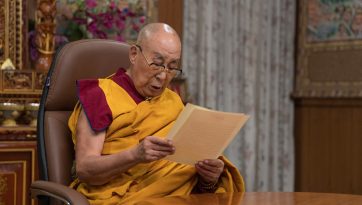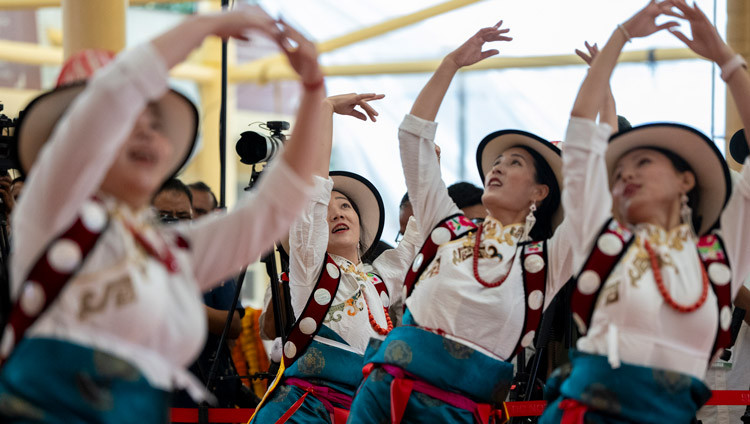Techfest IIT Bombay
December 14, 2018
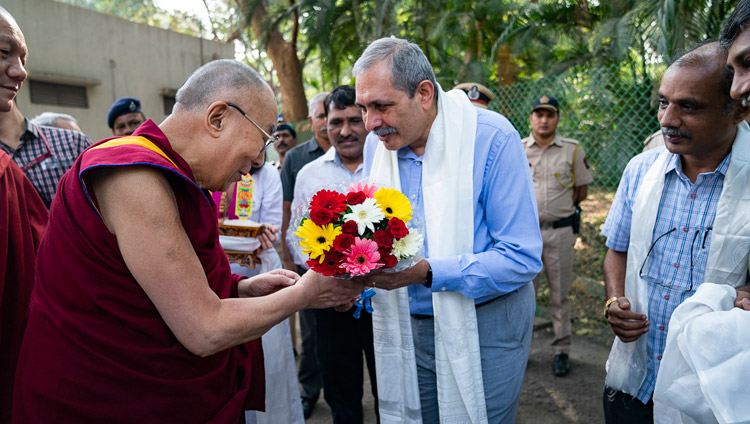
He was escorted directly to the Convocation Hall, where the stage was embellished with a thangka of the Medicine Buddha and several portraits of His Holiness, while the front was festooned with Tibetan prayer flags. Hands folded in salutation, he bowed to the audience of 2000, mostly students, from the centre and both corners of the stage before taking his seat.
A young Tibetan woman, Tenzin Dhekyong, who is a member of project staff, introduced His Holiness. She referred to his birth in Amdo, north-east Tibet, followed by his recognition as the Dalai Lama. She mentioned that Tibetans speak of him as ‘Yishin Norbu’ or ‘Wishfulfilling Jewel’. She outlined his commitments to fostering peace and happiness among human beings, encouraging inter-religious harmony, preserving Tibetan language and culture, speaking up for the protection of Tibet’s natural environment and working to revive interest in ancient Indian knowledge.
Director of IIT Bombay, Prof Devang Khakhar declared that it was most auspicious to have His Holiness speak at the college during its 60th anniversary. He welcomed him and all participants to the opening day of this year’s Techfest, which is a platform to bring together enthusiastic students of science and technology. Prof Khakhar mentioned that IIT Bombay aims to provide excellence in education, offering a broad array of programs that extend beyond science and engineering to include Economics, English, Philosophy, Psychology and Sociology.
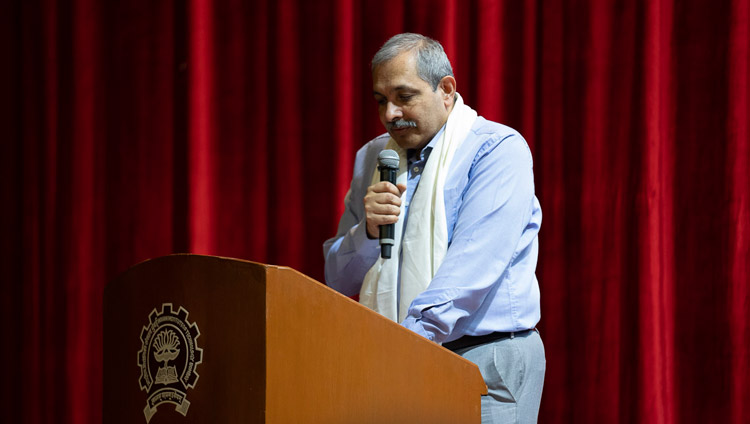
His Holiness greeted the audience:
“Good morning. I’m glad to see that you are mostly young people. When I’m among people like you, I feel younger too. My dear brothers and sisters, time is always moving on. Nothing can stop it. Some of us here, who are more than 30 years old, belong to the 20th century. Those of you who are not yet 30 years old belong to the generation of the 21st century. Whatever happened in the past can’t be changed, but the future is still in your hands. Those of you who belong to the 21st century, if you make the effort now, can create a better, happier world.
“People of my generation made a lot of trouble on this planet and it’s worth thinking about why. Everyone wants to lead a happy life and happiness is closely related to peace, but violence is always a source of suffering.
“Let me ask you, do you prefer to see someone smile or scowl?” The audience replied, “Smile.” “When people are smiling around you, don’t you feel happier and more secure? In 1954, I went to China and attended many official functions, all of which were held in a serious atmosphere. In 1956, here in India, meetings associated with the Buddha Jayanti were rather solemn too. I prefer it when people smile; it’s a reflection of friendship, which is in turn a reflection of trust and honesty.
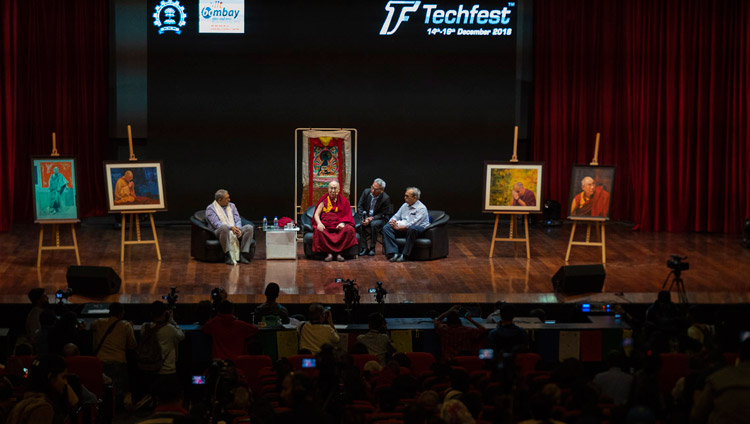
“It’s good to remember that other human beings are like us. We are born the same way; we die the same way. While we’re alive it’s better to be able to trust each other as friends. We earn other people’s trust when we show a genuine concern for their well-being.
“When we look back on the 20th century, there was far too much violence. Even the period after the Second World War was spoiled by fear and apprehension of further violence during the ‘Cold War’. Some historians have estimated that during the last century 200 million human beings suffered violent death as a result of war. If it had led to a better world, it might have been justified, but that isn’t the case.
“Although many people today seek peace, killing and violence are still taking place. People are even being killed in the name of religion—unthinkable. This is an example of our problems being of our own making. Young children don’t care about nationality, faith or caste. Because these ideas prompt us to think in terms of ‘us’ and ‘them’, they are divisive. They lead to violence, bullying and exploitation, and worst of all killing. The remedy is to look deeper and recognise that we human beings are physically, mentally and emotionally the same. We all have the potential to develop compassion.
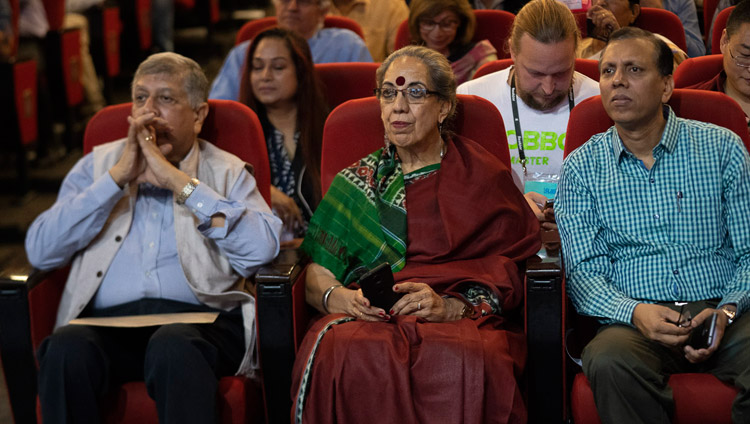
“We first experience affection and compassion in infancy at the hands of our mother. Medical experts point out that while constant anger and fear undermine our physical health, cultivating a warm-hearted attitude restores it. Therefore, in addition to teaching about physical hygiene, we should encourage emotional hygiene, learning to tackle our destructive emotions and enhance those that are beneficial.
“Knowledge of the workings of the mind and emotions has developed in India over the last 3000 years. Practices for cultivating a calmly abiding mind and insight, (shamatha and vipashyana), common to several spiritual traditions, contribute to the attainment of peace of mind.”
As to what mind or consciousness is or where it comes from, His Holiness distinguished between substantial and co-operative causes. He stated that consciousness does not arise from an arrangement of material particles. The substantial cause of consciousness is a previous moment of consciousness. This is why some people have memories of previous lives. The brain, meanwhile, is a co-operative condition for consciousness, much as the eye organ is a co-operative condition for eye consciousness.
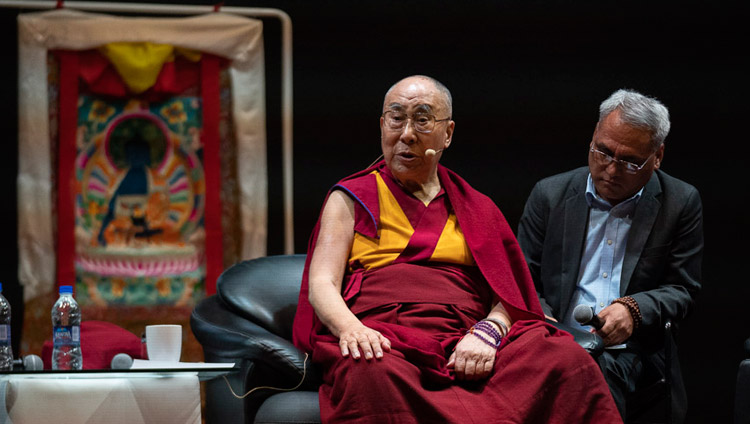
At conception, the substantial cause of a child’s body comes from the parents, but the substantial cause of his or her mind is a previous consciousness. That is why Buddhism speaks in terms of life after life.
“Ancient Indian knowledge of the workings of the mind and emotions in combination with modern education can contribute to the development of peace of mind. This is important because when the mind is overwhelmed by emotions like attachment or hatred it is difficult for it to be objective. A calm mind provides for that. Emotion is distracting and introduces bias, when what we need is to view things holistically.
“To study well we need a clear mind. When I was young I was reluctant to study, but later I came to appreciate that what I’d learned then was useful. It had the effect of opening up my intelligence. Those of you who have the opportunity today, please study well. Learn to combine your intelligence with warm-heartedness.”
Responding to spontaneous questions from the audience, His Holiness suggested that as people become fed up with violence, humanity is becoming more mature. Challenged to say whether a future Dalai Lama could be a woman he answered “Yes,” and pointed out that the Buddha had given his followers, women and men, equal opportunity in terms of ordination.
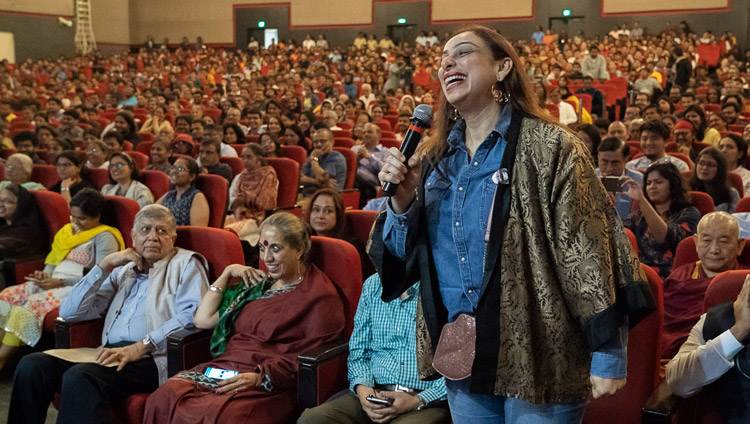
His Holiness agreed that climate change is a serious challenge, reporting that he has observed a steady decline in snowfall in Tibet and later in Dharamsala where he lives now. He warned that this will undoubtedly have a serious impact on water supply. Asked what he expects of future developments in technology, His Holiness mentioned that while others have great hopes for the development of artificial intelligence, he tends to be sceptical. In his view, technological development is derived from the human ingenuity and there is still a long way to go before technology emulates human consciousness.
His Holiness concluded that in addition to scientific findings and analytical thought, we need to rely on common sense and common experience. He pointed out that it’s easy to see that if members of a well-off family don’t trust each other, they won’t be happy. On the other hand, when a family of beggars treat each other with affection, happiness comes easily. What we can learn from this, he said, is that never mind about future lives, we need compassion and warm-heartedness here and now in this life.
His Holiness left the stage as members of the audience crowded forward to catch his attention. The Director and Dean of Student Affairs walked him to his car and he drove back to his hotel. Tomorrow, he will return to Delhi before travelling on to Bodhgaya.

